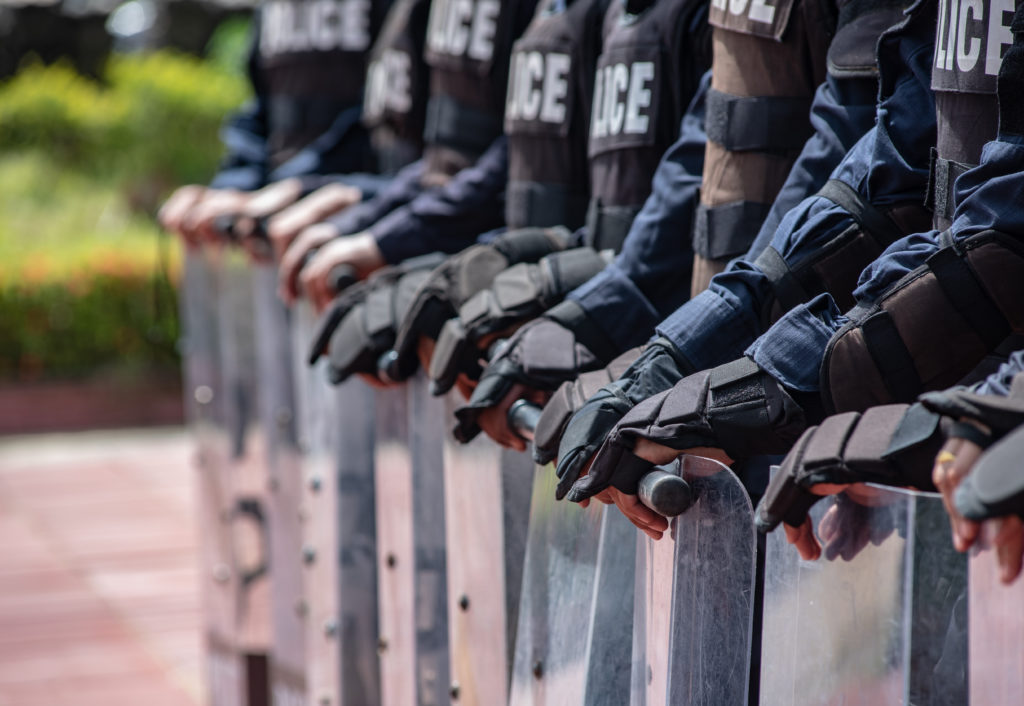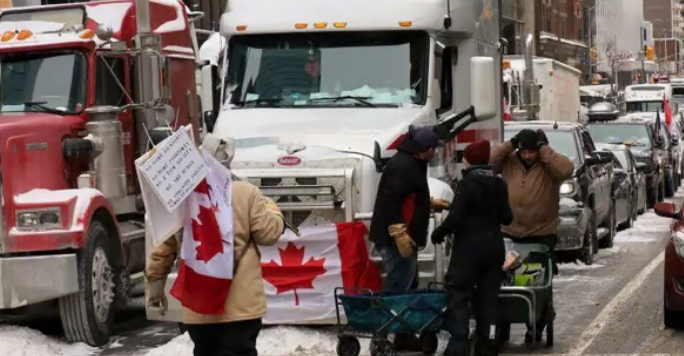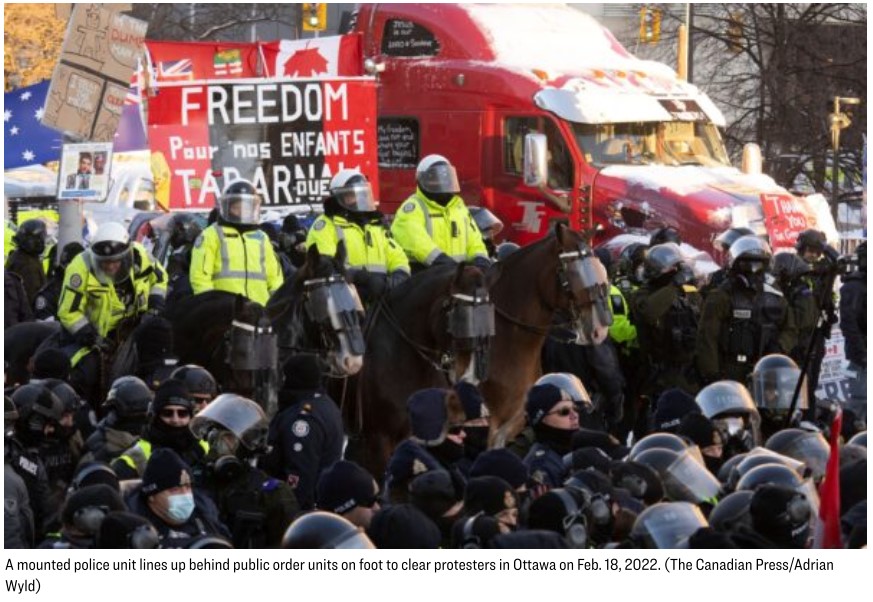Thousands gather in Ottawa to protest Government of Canada Covid mandates
In January and February 2022, thousands of Canadians travelled from coasts and mountains and prairies to the nation’s capital to protest Covid vaccine mandates. These mandates impacted millions of Canadians.
In British Columbia, dissenting healthcare workers and firefighters were fired. In Ontario, police officers were forced to take unpaid leave. In Nova Scotia, judges were threatened with suspension. In Quebec, government officials threatened a tax on the unvaccinated. Across Canada, thousands of conscientious objectors were fired from their jobs, suspended from their programs, and prevented from travelling.
Government of Canada invokes the Emergencies Act for first time in nation’s history
On February 14, the Government of Canada declared a “public order emergency” and invoked the Emergencies Act for the first time in Canadian history. Successor to the War Measures Act, the Emergencies Act grants the federal government unprecedented executive powers to handle threats to the security of Canada.
The invocation of the Emergencies Act transformed the peaceful atmosphere of the Freedom Convoy protest into a tactical operation as hundreds of armed officers descended on protestors and passersby. The police crackdown began in earnest on February 18. Within three days, the streets of downtown Ottawa were empty. But social media platforms were full of scenes of brutal police action. More than 400 charges were laid during the suppression of the protest. More than 257 bank accounts associated with the Freedom Convoy were also frozen, making it difficult for some Canadians to travel home or meet expenses.
The Emergencies Act cannot be invoked at any time for any reason. On the contrary, the law requires that the federal government must believe “on reasonable grounds” that there exist threats to the security of Canada so serious as to be a “national emergency” before the Act can be legally invoked. The term “threats to the security of Canada” is defined by the Canadian Security Intelligence Service Act:
(a) espionage or sabotage that is against Canada or is detrimental to the interests of Canada or activities directed toward or in support of such espionage or sabotage,
(b) foreign influenced activities within or relating to Canada that are detrimental to the interests of Canada and are clandestine or deceptive or involve a threat to any person,
(c) activities within or relating to Canada directed toward or in support of the threat or use of acts of serious violence against persons or property for the purpose of achieving a political, religious or ideological objective within Canada or a foreign state, and
(d) activities directed toward undermining by covert unlawful acts or directed toward or intended ultimately to lead to the destruction or overthrow by violence of, the constitutionally established system of government in Canada, but does not include lawful advocacy, protest or dissent, unless carried on in conjunction with any of the activities referred to in paragraphs (a) to (d).
Did the Government of Canada have sufficient reason to think that the Freedom Convoy presented a national threat to the security of Canada? Four Canadians did not think so.
Justice Centre helps four brave Canadians launch a constitutional challenge
On February 24, 2022, the Justice Centre helped four brave Canadians file a constitutional challenge to the invocation of the Emergencies Act and the freezing of bank accounts. Their names are Jeremiah Jost, Edward Cornell, Vincent Gircys, and Harold Ristau. Here are their stories.
Jeremiah Jost is a 28-year-old contractor and volunteer firefighter, who was concerned about the harms of Covid lockdowns, including the separation of his family caused by cross-border vaccine mandates. He felt compelled to join the Freedom Convoy from Alberta to Ottawa. He describes the protests as “entirely peaceful,” “a family friendly atmosphere,” and “beautiful, diverse, and inclusive to all.” His testimony further confirmed that “an emergency lane was open the entire time on Wellington Street.” On February 18, 2022, he observed tactical police advance with riot gear, gas masks, tasers, batons, pepper spray, flash grenades, rifles, and horses. Rooftop snipers surrounded the whole. Jeremiah provided the Court with a video he personally recorded of police horses trampling protestors and observers, including an elderly Indigenous woman with a walker. After observing the “terrifying and excessive” police actions toward peaceful protestors, including police beating, kneeing and striking protestors with the butt ends of rifles, Jeremiah testified that he and his wife left the Ottawa protest deprived of his constitutional right to peaceful assembly.
Edward Cornell is a decorated, 64-year-old retired military veteran from New Brunswick who served as an auxiliary OPP officer from 2013 to 2015. He and his wife joined the Freedom Convoy as it passed through Moncton, New Brunswick. Without warning, Mr. Cornell had his bank account and credit cards frozen, leaving him in a desperate financial position, and unable to pay his bills. Already suffering from PTSD, the crackdown on peaceful protestors like himself by his government left him feeling terrified and financially vulnerable. He said, “I broke no law, yet the government seized my accounts and froze my hard-earned money. I am not a criminal. I am not a terrorist. I am a retired Canadian military veteran who honourably served his country… I feel betrayed by my own government.”
Vincent Gircys is a retired member of the Ontario Provincial Police, an Exemplary Service Medal recipient, and a former Auxiliary Liaison Officer of the Year. Mr. Gircys served as security and as a police liaison during the protests. After the Emergencies Act had been invoked, Mr. Gircys observed police officers in tactical gear striking protesters with the butt ends of rifles and with 36-inch-long square-edged wooden batons. After Mr. Gircys’ bank accounts and credit cards were frozen, he was only able to feed himself and make the six-hour journey home thanks to the generosity of Canadians along the way.
Rev. Harold Ristau is an associate seminary professor, a former Canadian Armed Forces chaplain, and a retired officer with Canadian Special Operations Forces Command. Ristau led prayers at the National War Memorial and the Tomb of the Unknown Soldier during the Freedom Convoy protests in Ottawa. He has suffered significant personal and professional consequences because of the emergency measures taken by the Government of Canada. Later, Rev. Ristau received threats to his life for his participation in the Freedom Convoy.
On April 3, 2023, these brave Canadians shared their testimony at the Federal Court in Ottawa, arguing that the Government of Canada’s response to Freedom Convoy protestors:
(a) was ultra vires the provision of the Emergencies Act or any other enabling statute or instrument;
(b) was ultra vires s.91 of the Constitution Act, 1867;
(c) violated s.96 of the Constitution Act, 1867;
(d) violated s.2(b), s.2(c), s.2(d), s.6, s.7, s.8, s.9, s.12 and s.15 of the Charter;
(e) violated s.1 of Canadian Bill of Rights S.C. 1960, c. 44;
(f) violated constitutional principles, specifically rule of law, constitutionalism, parliamentary sovereignty, separation of powers, and contractual expectations;
(g) violated the preamble of the Emergencies Act;
(h) violated the International Covenant on Civil and Political rights, specifically Articles 1(2), 2, 4,5 7,8, 9, 10(1), 12(1), 16, 17, 18, 19, 22(1), 26 and 47;
(i) violated the International Covenant on Economic, Social and Cultural Rights, specifically Articles 1 (2), 2(2), 3, 4, 5, 6(1 ), 11 (1) and 25; and
(j) violated international law obligations, specifically principles of customary international law including the general principle of the rule of law, the principle of non-discrimination, the United Nations Declaration of Human Rights, freedom from fear and international human rights norms; and
(k) violated the Vienna Convention on the Law of Treaties.
Lawyer Marty Moore stated, “The evidence of these four Canadian protestors shows a shared sense of betrayal by the Government for invoking emergency measures to mount a needless and militaristic crackdown on peaceful protesters that left them fearful for their futures and the future of Canada. The Federal Court has an important responsibility to hold the Government to account and prevent the unjustified claim of an ‘emergency’ to trample on the rights of Canadians.”
Federal Court rules that Government of Canada’s response to Freedom Convoy was illegal and unconstitutional
The Honourable Justice Mosley handed down his decision on January 23, 2024. He found that the federal government lacked sufficient justification to invoke the Emergencies Act.
He wrote, “I have concluded that the decision to issue the Proclamation does not bear the hallmarks of reasonableness – justification, transparency and intelligibility – and was not justified in relation to the relevant factual and legal constraints that were required to be taken into consideration. In my view, there can be only one reasonable interpretation of EA sections 3 and 17 and paragraph 2(c) of the CSIS Act, and the Applicants have established that the legal constraints on the discretion of the GIC to declare a public order emergency were not satisfied.”
He found that the prime minister and his cabinet did not have reasonable grounds to believe that a threat to national security existed within the meaning of the Emergencies Act, so therefore their decision was ultra vires (outside of the powers) of the legislation. In 2022 in downtown Ottawa, there was no “serious violence or threats of serious violence” as defined by the Emergencies Act.
Justice Mosley ruled that “[t]he record does not support a conclusion that the Convoy had created a critical, urgent and temporary situation that was national in scope and could not effectively be dealt with under any other law of Canada.”
Justice Mosley further found that the protesters’ Charter-protected right to be free from unreasonable search and seizure was unjustifiably violated when the federal government froze their bank accounts.
Noting that “protests are inherently disruptive and are constitutionally protected political expression that goes to the core of the freedom,” and that “political speech is granted the highest level of protection because of its essential role in democratic life,” Justice Mosley also found that the emergency powers unjustifiably violated the Charter-protected freedom of expression of protestors.
Here is what Vincent Gircys had to say about the ruling: “When our government is wrong it’s dangerous to be right. Following 32 years of service with the Ontario Provincial Police, I chose to support Canadians facing government overreach. I did so by being vocal and informative regarding the Canadian Charter of Rights and Freedoms relative to government mandates and the resultant abusive police response. As the Emergencies Act was invoked, my bank account along with hundreds of other victims were frozen by the state. With assistance from the Justice Centre for Constitutional Freedoms, a court challenge commenced resulting in a response that restored my belief in our justice system once again. The full summary of the Judgement was thoroughly detailed. I have no doubts relating to the professionalism and preparation of Justice Mosley’s findings, and I am confident it will withstand the intended appeal by our federal government.”
Here is what Eddie Cornell had to say about the ruling: “I would like to say how greatly I appreciate the tremendous support given to all of us involved in this historic and landmark decision by the Federal Court. Without the support of the Justice Centre for Constitutional Freedoms, it would have been a much greater task to accomplish what has been done. Thank you so much for your generosity and your leadership to support freedom in this country. This is a victory for all Canadians, not just the litigants. I also feel that the government’s choice to appeal is to be expected. Having thoroughly read Justice Mosley’s decision, I think it will ultimately fail in the appeal. To my fellow Canadians, this historic decision is a victory for us all. It is proof that standing up for our rights is worth holding the line. I am so proud as a Veteran to have experienced this moment in history with all of you.”
Government of Canada appeals ruling at Federal Court of Appeal
On the same day, Justice Mosley release his decision on the Application for Judicial Review from Mr. Jost, Mr. Cornell, Mr. Gircys and Mr. Ristau. He ruled that Mr. Jost and Mr. Ristau lacked standing and so dismissed their application for a judicial review. Mr. Cornell and Mr. Gircys were granted standing due to the freezing of their bank accounts. They were awarded costs.
On January 23, the very day the Federal Court ruling was announcing, Deputy Prime Minister Chrystia Freeland announced that the Government of Canada would appeal the ruling at the Federal Court of Appeal. On February 22, 2024, the government filed their appeal of the ruling.









